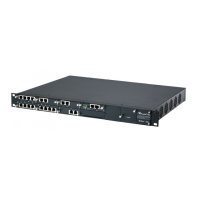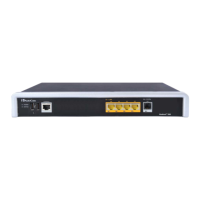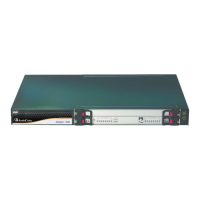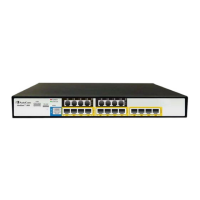User's Manual 610 Document #: LTRT-89730
Mediant 3000
Parameter Description
Note: If you need to route calls of many different destination URI user
names to the same destination, you can use tags (see 'Destination Tags'
parameter below) instead of this parameter.
Destination Host
[IP2IPRouting_DestHost]
Defines the host part of the incoming SIP dialog’s destination URI
(usually the Request-URI).
The default is the asterisk (*) symbol (i.e., any destination host). If this
rule is not required, leave this field empty.
Destination Tags
dst-tags
[IP2IPRouting_DestTags]
Assigns a tag to denote destination URI user names corresponding to
the tag configured in the associated Dial Plan.
The valid value is a string of up to 20 characters. The tag is case
insensitive.
To configure tags, see Configuring Dial Plans on page 638.
Note:
Make sure that you assign the Dial Plan in which you have configured
the tag, to the related IP Group or SRD.
Instead of using tags and configuring the parameter, you can use the
'Destination Username Prefix' parameter to specify a specific URI
destination user or all destination users.
Message Condition
[IP2IPRouting_MessageC
onditionName]
Assigns a SIP Message Condition rule to the IP-to-IP Routing rule.
For configuring Message Condition rules, see ''Configuring Message
Condition Rules'' on page 602.
Call Trigger
[IP2IPRouting_Trigger]
Defines the reason (i.e., trigger) for re-routing the SIP request:
[0] Any = (Default) This routing rule is used for all scenarios (re-
routes and non-re-routes).
[1] 3xx = Re-routes the request if it was triggered as a result of a SIP
3xx response.
[2] REFER = Re-routes the INVITE if it was triggered as a result of a
REFER request.
[3] 3xx or REFER = Applies to options [1] and [2].
[4] Initial only = This routing rule is used for regular requests that the
device forwards to the destination. This rule is not used for re-routing
of requests triggered by the receipt of REFER or 3xx.
[5] Broken Connection = If the device detects a broken RTP
connection during the call and the Broken RTP Connection feature is
enabled (IpProfile_DisconnectOnBrokenConnection parameter is
configured to [2]), you can use this option as an explicit matching
characteristics to route the call to an alternative destination.
Therefore, for alternative routing upon broken RTP detection, position
the routing rule configured with this option above the regular routing
rule associated with the call. Such a configuration setup ensures that
the device uses this alternative routing rule only when RTP broken
connection is detected.
ReRoute IP Group
[IP2IPRouting_ReRouteIP
GroupName]
Defines the IP Group that initiated (sent) the SIP redirect response (e.g.,
3xx) or REFER message. This parameter is typically used for re-routing
requests (e.g., INVITEs) when interworking is required for SIP 3xx
redirect responses or REFER messages. For more information, see
''Interworking SIP 3xx Redirect Responses'' on page 570 and
''Interworking SIP REFER Messages'' on page 572
, respectively. The
parameter functions together with the 'Call Trigger' parameter (in the
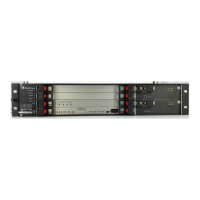
